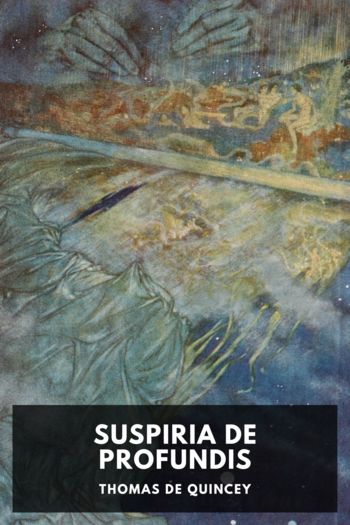Suspiria de Profundis, Thomas De Quincey [cool books to read .txt] 📗

- Author: Thomas De Quincey
Book online «Suspiria de Profundis, Thomas De Quincey [cool books to read .txt] 📗». Author Thomas De Quincey
Among the powers in man which suffer by this too intense life of the social instincts, none suffers more than the power of dreaming. Let no man think this a trifle. The machinery for dreaming planted in the human brain was not planted for nothing. That faculty, in alliance with the mystery of darkness, is the one great tube through which man communicates with the shadowy. And the dreaming organ, in connection with the heart, the eye, and the ear, composes the magnificent apparatus which forces the infinite into the chambers of a human brain, and throws dark reflections from eternities below all life upon the mirrors of that mysterious camera obscura—the sleeping mind.
But, if this faculty suffers from the decay of solitude, which is becoming a visionary idea in England, on the other hand it is certain that some merely physical agencies can and do assist the faculty of dreaming almost preternaturally. Amongst these is intense exercise—to some extent at least, for some persons; but beyond all others is opium: which indeed seems to possess a specific power in that direction; not merely for exalting the colours of dream-scenery, but for deepening its shadows, and, above all, for strengthening the sense of its fearful realities.
The Opium Confessions were written with some slight secondary purpose of exposing this specific power of opium upon the faculty of dreaming, but much more with the purpose of displaying the faculty itself; and the outline of the work travelled in this course:—Supposing a reader acquainted with the true object of the Confessions as here stated—namely, the revelation of dreaming—to have put this question:
“But how came you to dream more splendidly than others?”
The answer would have been—
“Because (praemissis praemittendis) I took excessive quantities of opium.”
Secondly, suppose him to say, “But how came you to take opium in this excess?”
The answer to that would be, “Because some early events in my life had left a weakness in one organ which required (or seemed to require) that stimulant.”
Then, because the opium dreams could not always have been understood without a knowledge of these events, it became necessary to relate them. Now, these two questions and answers exhibit the law of the work, that is, the principle which determined its form, but precisely in the inverse or regressive order. The work itself opened with the narration of my early adventures. These, in the natural order of succession, led to the opium as a resource for healing their consequences; and the opium as naturally led to the dreams. But, in the synthetic order of presenting the facts, what stood last in the succession of development stood first in the order of my purposes.
At the close of this little work, the reader was instructed to believe, and truly instructed, that I had mastered the tyranny of opium. The fact is that twice I mastered it, and by efforts even more prodigious in the second of these cases than in the first. But one error I committed in both. I did not connect with the abstinence from opium, so trying to the fortitude under any circumstances, that enormity of exercise which (as I have since learned) is the one sole resource for making it endurable. I overlooked, in those days, the one sine qua non for making the triumph permanent. Twice I sank, twice I rose again. A third time I sank; partly from the cause mentioned (the oversight as to exercise), partly from other causes, on which it avails not now to trouble the reader. I could moralise, if I chose; and perhaps he will moralise, whether I choose it or not. But, in the meantime, neither of us is acquainted properly with the circumstances of the case: I, from natural bias of judgement, not altogether acquainted; and he (with his permission) not at all.
During this third prostration before the dark idol, and after some years, new and monstrous phenomena began slowly to arise. For a time, these were neglected as accidents, or palliated by such remedies as I knew of. But, when I could no longer conceal from myself that these dreadful symptoms were moving forward forever, by a pace steadily, solemnly, and equably increasing, I endeavoured, with some feeling of panic, for a third time to retrace my steps. But I had not reversed my motions for many weeks before I became profoundly aware that this was impossible. Or, in the imagery of my dreams, which translated everything into their own language, I saw, through vast avenues of gloom, those towering gates of ingress which hitherto had always seemed to stand open now at last barred against my retreat, and hung with funeral crape.
As applicable to this tremendous situation (the situation of one escaping by some refluent current from the maelstrom roaring for him in the distance, who finds suddenly that this current is but an eddy wheeling round upon the same maelstrom), I have since remembered a striking incident in a modern novel.
A lady-abbess of a convent, herself suspected of Protestant leanings, and in that way already disarmed of all effectual power, finds one of her own nuns (whom she knows to be innocent) accused of





Comments (0)